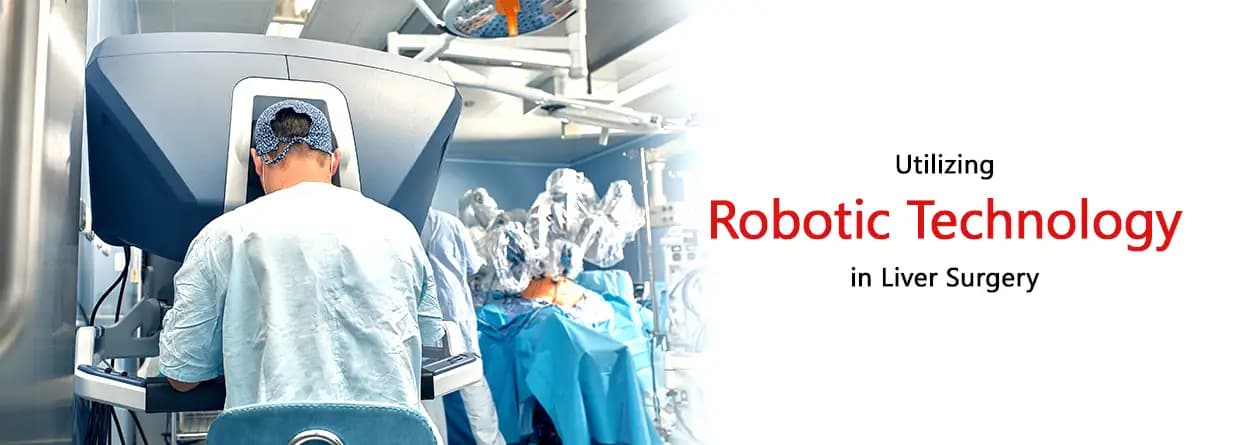
Robotic liver surgery is the latest technological advancement in the field of Liver surgery, where the surgeon uses robotic instruments to perform surgery. During the surgery, the surgeon sits on a console and operates it using small instruments.
Due to the advancement in the medical field, complex surgeries like liver surgery are becoming more precise, safe, and minimally invasive. Today, due to the inclusion of robotic technology the complications of this surgery have been reduced, and the success rate has been increased.
In this article, we will discuss robotic hepatectomy, its benefits, and its application in complex operations like liver transplants. For liver-related issues, it is advisable to talk to our Gasteroenterologist.
Robotic liver surgery is the latest technological advancement in the field of Liver surgery, where the surgeon uses robotic instruments to perform surgery. During the surgery, the surgeon sits on a console and operates it using small instruments.
The robotic arms have surgical equipment and high-definition cameras, which makes the surgery more precise and safe. Compared to traditional surgery, these robotic arms are responsible for fewer postoperative complications and speedy recovery.
In the last few years, surgeons can perform more complex robotic hepatectomy and robotic liver transplant surgeries just because of this revolutionary technology. A hepatectomy, or liver resection, is a surgical procedure that involves the removal of a portion or the entire liver, which is cancerous. This surgery is advised for cancerous tumours and is also utilised in liver transplantation procedures.
So, one of the biggest advantages of Robotic-Assisted Liver Surgery is that now surgeons can perform highly sensitive and complex liver surgery, with more precision and success rate, which supersedes the traditional method.
Along with this, robotic surgery is minimally invasive, which means the surgeon needs to make a small cut on the body, which leads to faster recovery and fewer complications.
On several points, we can say that robotic liver surgery is better than traditional surgery. Here, we have quoted some of the major advantages of choosing Robotic surgery for your liver issues:
Let’s briefly understand the benefits of Robotic Liver Surgery:

Robotic surgery in liver transplantation has revolutionised the field of surgery. This technology increases precision, reduces complications, and ensures faster recovery for the patients. Here are the few applications of robotic surgery in liver transplants, which you should need to know -
For complex surgeries that involve hard-to-reach areas, robotic arms lend the doctor enhanced dexterity. Whereas the HD visibility of the surgical areas removes any chances of surgical errors. This is why more and more surgeons prefer this new approach. For the patients undergoing these surgeries, the highlights are:
Robotic surgery has been a significant advancement in the medical field, and its applications are expanding, especially in complex procedures like liver operations. At CK Birla Hospitals, we are proud to offer this advanced and latest technology to our patients, providing them with precise, minimally invasive treatments that promote faster recovery and reduced postoperative complications. We always try to ensure that our patients receive the best possible care!
Usually, robotic liver surgery is considered safe. But, there are few complications which a person can face, but that is rare. Recent studies have also confirmed that this technique is safer than traditional surgery.
The recovery period after robotic liver surgery is much shorter than traditional liver surgery. The recovery period after the robotic liver surgery is 2-3 weeks, but in traditional surgery it is around 6-8 weeks.
As we told earlier that robotic surgery is safe surgery, but still, there are few complications, which can arise like infection, bleeding, and in rare cases equipment failure.
Written and Verified by:
-Dr.-Sanjay-Dey-Bakshi-(-General-Surgery-).webp&w=256&q=75)
Dr. Sanjay De Bakshi is a Consultant Surgeon in Surgical Gastroenterology at CMRI, Kolkata, with over 33 years of experience. He specializes in gallbladder surgery, hernia repair, and colorectal procedures.
Similar Gastro Sciences Blogs
Book Your Appointment TODAY
© 2024 CMRI Kolkata. All Rights Reserved.